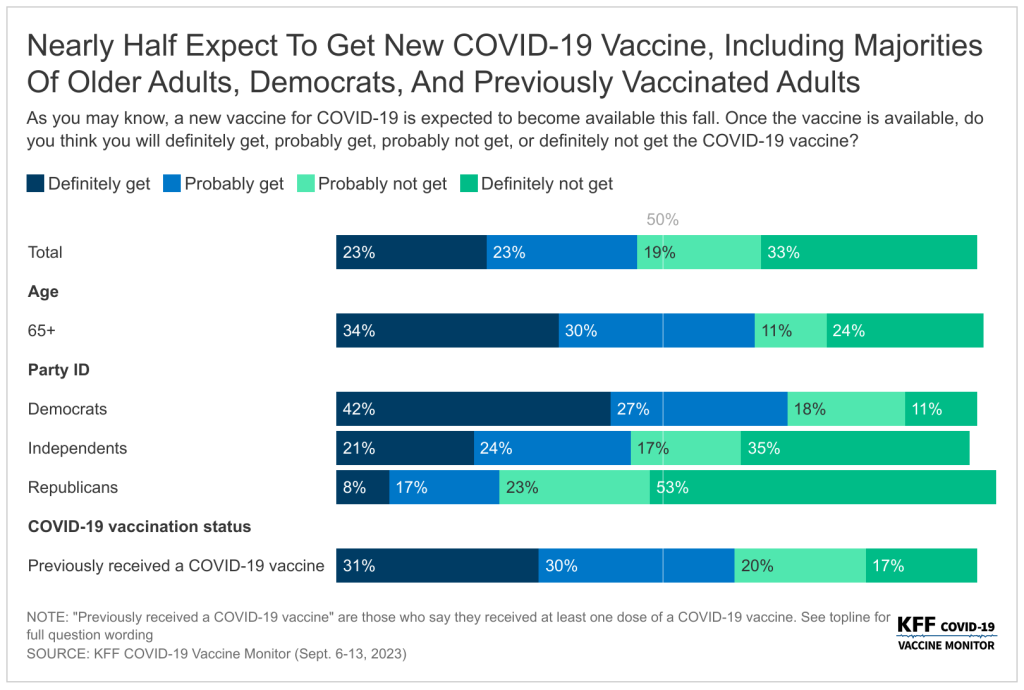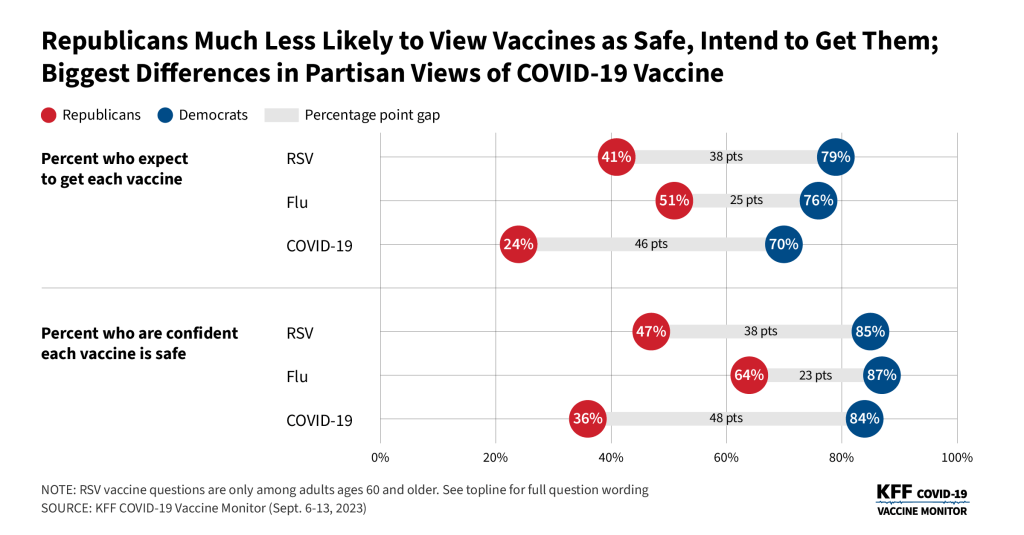
The independent source for health policy research, polling, and news.
Poll: Nearly Half of Adults Expect to Get the New COVID-19 Vaccine, But Most Parents Don’t Expect to Get It for Their Children; More Eligible Adults Expect to Get a Flu Shot and the New RSV Vaccine
Republicans are Much Less Likely than Democrats to View Fall Vaccines as Safe Or Expect to Get Them, though COVID-19 Sparks the Greatest Split in Intentions and Views
Nearly half of adults say that they will “definitely” or “probably” get the newly recommended COVID-19 vaccine, though most parents are not planning to get the shot for their children, according to the latest KFF COVID-19 Vaccine Monitor poll.
Among all adults, 23% say they will definitely get the new vaccine, 23% say they will probably get it, while 19% say they will probably not get it and 33% say they definitely not get it.
The share of the public who intend to get the new COVID-19 vaccine is higher than the share who have received previous booster shots, but not as high as initial vaccine uptake back in 2020. Almost four in ten (37%) people who previously received a COVID-19 vaccine say that they probably or definitely won’t get the new shot. Reflecting patterns from earlier vaccine rollouts during the pandemic, the groups most likely to say they definitely or probably will get the new vaccine include people at least 65 years old (64%) and Democrats (70%).

While the new COVID-19 vaccine is recommended for children ages 6 months and up, fewer than four in ten parents say they expect to get the vaccine for their children ages 12-17 (39%), ages 5-11 (36%), and ages 6 months through 4 years (34%). More than half of parents with children in each age group say they probably or definitely won’t get their children vaccinated.
The latest survey also shows that somewhat larger shares of eligible people expect to get an annual flu shot and a newly recommended vaccine for RSV (respiratory syncytial virus) than plan to get the COVID-19 vaccine. For example, most adults (58%) say that they have already gotten or expect to get a flu shot, and most adults ages 60 and older (60%) say they have already gotten or expect to get the new RSV vaccine (recommended for their age group).
As has been true throughout the pandemic, a much smaller share of Republicans (24%) than Democrats (70%) expect to get the new COVID-19 vaccine – 46 percentage point gap.
There are smaller, but still considerable, partisan divisions in intentions for these vaccines than for the COVID-19 shot: for example, 76% of Democrats and 51% of Republican expect to get or have already gotten a flu shot this fall (a 25-point gap), while among those ages 60 and older, 79% of Democrats and 41% of Republicans expect to get or having already gotten an RSV vaccine (a 38-point gap)
Republicans are also less likely than Democrats to be confident that each of three vaccines are safe, with the biggest divide for the COVID-19 vaccine (84% of Democrats and 36% of Republicans are confident it is safe).

The partisan divides persist across a wide range of measures related to vaccines and the COVID-19 pandemic. Some examples:
- Trust in public health agencies. Overall, 63% of the public trust the Centers for Disease Control and Prevention (CDC) a great deal or a fair amount when it comes to providing reliable information about vaccines, and 61% trust the Food and Drug Administration (FDA). Much larger shares of Democrats than Republicans have at least a fair amount of trust in vaccine information from the CDC (88% vs. 40%), their local public health departments (87% vs. 51%), and the Food and Drug Administration (86% vs. 42%).
- Perceptions about threat. Three quarters (77%) of Democrats say that there is a new wave of COVID-19 infections across the country. In contrast, similar shares of Republicans say there is (48%) and isn’t (51%) a new wave.
- Taking precautions. Democrats are more than three times as likely as Republicans (58% vs. 16%) to say that news about the new COVID-19 wave has led them to take extra precautions, including being more likely to wear a mask in public or avoid large public gatherings, or being less likely to travel or to dine indoors at restaurants.
- Getting tested. Republicans are half as likely as Democrats (9% vs. 19%) to say that they were sick in recent months and got a COVID-19 test.
“The poll shows that most of the nation still trusts the CDC and the FDA on vaccines – but there is a partisan gap, and most Republicans don’t trust the nation’s regulatory and scientific agencies responsible for vaccine approval and guidance,” KFF President and CEO Drew Altman said.
One area where partisans agree is that their personal doctors, including their children’s pediatricians, are their most trusted sources of vaccine information.
Most adults (68%) also say they normally keep up-to-date with the vaccines that are recommended by their own doctor, including 82% of Democrats and 61% of Republicans. Large majorities of parents – regardless of partisan identification – say they keep their children up to date on recommended childhood vaccines, with just 10% saying they delayed or skipped some vaccines.
Other poll results include:
- Following the end of the COVID-19 public health emergency in May, most insured people now say they are unsure whether their health insurance covers either in-home, rapid COVID-19 tests (55%) or PCR COVID-19 tests that are sent to a lab for results (61%).
- In addition, one in seven (15%) say they’ve wanted to get a COVID-19 test but were not able to find or afford one. Those most likely to report difficulties obtaining a COVID-19 test includes at least one in five Black adults (25%), Hispanic adults (21%), and people with household incomes under $40,000 annually (21%).
- Most adults (68%) and parents (55%) – say that healthy children should be required to be vaccinated against measles, mumps, and rubella to attend public school; fewer adults (31%) and parents (43%) say that parents should be able to decide not to vaccinate their children even if that may create health risks for others.
Designed and analyzed by public opinion researchers at KFF, the survey was conducted from September 6-13, 2023, online and by telephone among a nationally representative sample of 1,296 U.S. adults. Interviews were conducted in English and in Spanish. The margin of sampling error is plus or minus four percentage points for the full sample. For results based on other subgroups, the margin of sampling error may be higher.